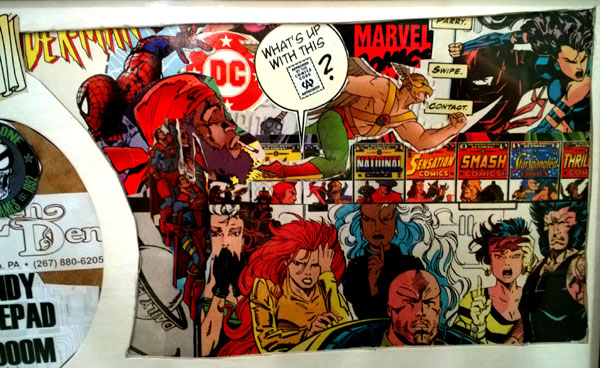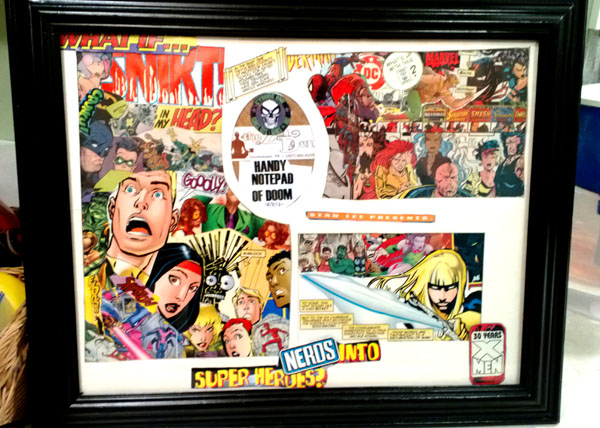A Sacrifice of Heroes
“To paint comic books as childish and illiterate is lazy.
A lot of comic books are very literate – unlike most films.”
-Alan Moore, author
and comic book writer
Childhood safety. It’s a favorite blanket, tattered from being drug on countless adventures. It’s a plush toy with a silly name. It’s a parents’ arms. It’s a heady scent mixed with the caramel toast of roasted marshmallows, the tang of green apple and a hint of some exotic spice like cardamom. At least, if you’re me. Is that the smell of some rare tea boutique?
Nope. It’s the distinctive mélange of your local comic book store. The wonderful wash of displayed books—a Pointillist bosom of primary colors—hits my eyes next, but the sharp, sweet smell of Wednesday fresh comics always envelopes me first. With that smell, I relax into my Fortress, the first Church of my youth, my shelter.
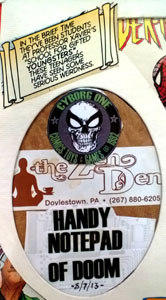 “Some people collect for investment…for pure enjoyment…to expand their social lives…exchanging information with like-minded souls…to preserve the past…” according to professor of psychology, Mark McKinley, “For some people collecting is simply the quest, in some cases a life-long pursuit that is never complete.” Comic Books, Baseball (Yes, and other sports) Cards, Beanie Babies, Stamps, any collection pursuit is likely forged with some of those motivations fulfilled. Those formative collections, womb-like to our adolescent selves—also offer deeper benefits such as “psychological security” and “filling a void in a sense of self.” So what happens when we’ve outgrown our collections and it’s time to say goodbye? (McKinley, 2007)
“Some people collect for investment…for pure enjoyment…to expand their social lives…exchanging information with like-minded souls…to preserve the past…” according to professor of psychology, Mark McKinley, “For some people collecting is simply the quest, in some cases a life-long pursuit that is never complete.” Comic Books, Baseball (Yes, and other sports) Cards, Beanie Babies, Stamps, any collection pursuit is likely forged with some of those motivations fulfilled. Those formative collections, womb-like to our adolescent selves—also offer deeper benefits such as “psychological security” and “filling a void in a sense of self.” So what happens when we’ve outgrown our collections and it’s time to say goodbye? (McKinley, 2007)
I had come to Cyborg One carying boxes laden with my youth but heavy with the fear that I would leave all alone.
Origin Story: A Life of Pulp and Ink
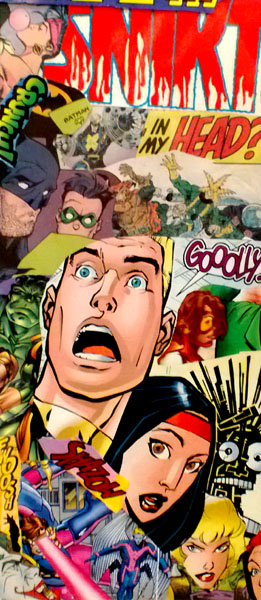 “Making collections, getting attached to things, is not an embarrassing thing once museums legitimize your habit of collecting. But if there are no museums, then…your collections, exhibit only your personal wounds.”
“Making collections, getting attached to things, is not an embarrassing thing once museums legitimize your habit of collecting. But if there are no museums, then…your collections, exhibit only your personal wounds.”
-Orhan Pamuk, Nobel laureate
Christopher Robin? Neglected kid with no parental figures who was left unsupervised in the woods. He needed his Poo. Wendy Darling and Peter? An over-parentified daughter of an emotionally distant father with an incompetent governess. Jackie Paper and Puff the Magic Dragon? Don’t get me started.
We all have our childhood heroes and imaginary friends, be they embellished, like those above, or Pete Rose and Babe Ruth, or Wolverine and Batman, and they play a great role in helping us establish our adult identity and settle internal conflict. Renowned author Werner Muensterberger, said in his master-work Collecting: An Unruly Passion that “the act of accumulating repeated examples of a beloved collectible reduces the tension between id and ego and becomes ‘an experiment in self-healing’—invariably, of a childhood trauma or anxiety.” (Kirkus, 2013) The fullness of this may be true for an extreme collector, but for the mainstream of us, I agree with Elias Aboujaoude, a psychiatrist at the Stanford School of Medicine. Let’s not “…pathologize collecting,” too severely. We all grow up and use our heroes and toys to get us there. “Almost everyone is attached to a certain kind of item,” he assured. (Winn, 2003)
For me, I lived The X-Men, New Mutants, Fallen Angels, Captain America, Iron Man and to a lesser and later degree Batman, The Flash, Green Arrow, Teen Titans, Young Justice and Nightwing. I grew up with Marvel Universe Heroes. Yes, my parents raised me right. But Captain America taught me to do the right thing no matter the cost. And to punch every Nazi in the face. Batman and Iron Man taught me that your intelligence and determination will get you farther than wealth—but wealth helps. Perhaps most importantly, the X-Men (and the New Mutants and Fallen Angels) taught me that we all are outcasts, misfits, and though the world may not “hate and fear” me as a mutant, I must still do the honorable thing and help others, not resent them for seeing me differently.
That’s what I was, you see. I was an overweight geek, picked on and picked last. I was witty, to those who I didn’t feel intimidated by, and thus the geek became the comic book geek, and united in the common-good of the Comics Code, I found my own Legion of Superheroes—friends. I became much of the man I am today 24 pages of sequential art at a time.
But years had passed and my dear collection passed with them, from parents’ home to apartment, to my marital home which is now my daughters’ home. I still smelled the bright, inky tang of the comics when I opened the boxes—and I still bought more—but an alarming odor was creeping in. Mold. Age.
In collecting “the satisfaction comes from experimenting with arranging, re-arranging, and classifying parts of a-big-world-out-there, which can serve as a means of control to elicit a comfort zone in one’s life, e.g., calming fears, erasing insecurity.” It took years but I had come to realize that I didn’t “arrange and re-arrange” my comics anymore—in fact, I rarely touched them. My fears were calm, my insecurity had secured (mostly) and I now had a home and a dear young family which is all the “comfort zone” a man, even a comic book geek man, needs. (McKinley, 2007)
Masks Off, We Face Our Nemeses
“Why certain people leave their childhood Barbie doll and penny collections behind and others become committed collectors is a psychological riddle.”
–Graeme Hanson, UCSF Clinical Professor of Psychiatry
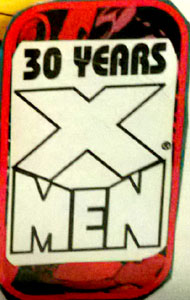 I wouldn’t dare to tell you if selling your collection, a great material catharsis of that profound nature, is right for you. That is your nemeses, and you mace face it with your mask off. I can offer some tools.
I wouldn’t dare to tell you if selling your collection, a great material catharsis of that profound nature, is right for you. That is your nemeses, and you mace face it with your mask off. I can offer some tools.
First off, listen to Ingrid Schaffner, of Philadelphia’s Institute of Contemporary Art; “Collecting is just another way of organizing thought,” so get alone with your collection. Look over the Barbies, heft your darlings, thumb their pages. Think about letting go. How much pain and distress does it cause? How much joy? Always remember, there is pride in collecting and there’s nothing wrong with that. “Focusing on objects, after all,” Schaffner added, “their beauty, function and relationship to each other, may be a kind of self-sustaining process of externalized emotion. It’s a kind of art.” If you are still so close to your art that it sustains you, then keep it and be joyful because it still has its full value. (Winn, 2003)
In terms of value, it’s what we all must realize; our collections will always have more value in our hearts than in our bank accounts—and surely than in the eyes of dealers. We feel the history and we feel the attachment to those items because of the way they’ve influenced our personal character. The comics that I had the most trouble parting with were the ones that the dealer didn’t give a second look, and one highly valuable issue (Gambit’s first appearance in X-men) was one I didn’t even like.
If the pain of letting go is too hurtful, then don’t let go, use it as an opportunity to further understand yourself. What is your collection trying to still teach you about you? I’ve spent more time over the last year checking out old issues in my basement and on eBay, introducing my daughter to the Comic Book Store Smell and marinating in my youthful lessons than in the last 10 years. My perspective had shifted enough that thought I understood the real world value, personal value and parting lesson of my collection, and only then did I act.
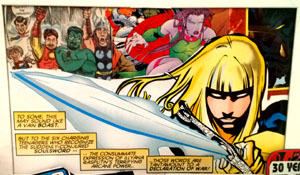 The parting lesson—not the last one, because my collection will always be part of me—was in embracing the “magical relationship [which] develops between collector and object” for the power that it holds still. These books got me through my hard times and helped make me who I am. Their value was in how the stories they told me during my journey were the ones that I needed to hear at the time. I was keeping these super-powerful parables from those who could use them right now so that they could molder in my basement? It was a selfish blasphemy. (Kirkus, 2013)
The parting lesson—not the last one, because my collection will always be part of me—was in embracing the “magical relationship [which] develops between collector and object” for the power that it holds still. These books got me through my hard times and helped make me who I am. Their value was in how the stories they told me during my journey were the ones that I needed to hear at the time. I was keeping these super-powerful parables from those who could use them right now so that they could molder in my basement? It was a selfish blasphemy. (Kirkus, 2013)
As I walked out the doors of Cyborg One, I had some cash in my pocket (with which I bought a coffee at the Zen Den—see inset) but I had something more. I had contentment and I felt that the stories were now free to move into other lives and work their magic afresh. Part of that magic lives in me and in my home. Part of it is growing in my daughter, but the comics themselves are once again out there and I was released of a weight that I hadn’t fully comprehended until out from under it. The tonnage of three long, heavy boxes and one teenage lifetime. I smiled much as I walked back to my car, sipping the hot spoils of my sale. I had that content feeling I used to get when I closed the cover of a fine comic book. “Man, that was a great story.”
The Statue of Our Hero Stands Proud Forever
“Grown-ups…are a strange breed! Their brains weigh close to three pounds,
and that’s not three pounds of cheery delight!”
-The Tick
But I didn’t sell them all. What do you think, I’m crazy?!
Of course I kept my favorites. Anything that held real sentimental value is still in my house and now much more protected from mold. Anything that I want to pass on directly to my daughter is still here. And, yes, there’s still one run of comics that I don’t have complete, which I will still seek out in nostalgic pursuit.
 In To Have and to Hold: An Intimate History of Collectors and Collecting, Philipp Blom said collecting is a “‘philosophical project’ that seeks to ‘make sense of the multiplicity and chaos of the world, and perhaps even to find in it a hidden meaning.’” I think he’s quite correct. What he left out was the final piece, to take that hidden meaning and make it mine. To internalize our collections as parts of ourselves. I made the framed collage (below and inset) to remind my of my actual collection, but the truth is, I see it everywhere. (Winn, 2003)
In To Have and to Hold: An Intimate History of Collectors and Collecting, Philipp Blom said collecting is a “‘philosophical project’ that seeks to ‘make sense of the multiplicity and chaos of the world, and perhaps even to find in it a hidden meaning.’” I think he’s quite correct. What he left out was the final piece, to take that hidden meaning and make it mine. To internalize our collections as parts of ourselves. I made the framed collage (below and inset) to remind my of my actual collection, but the truth is, I see it everywhere. (Winn, 2003)
This web site is my collection—there’s me as a hero on the front page.
I write because of my collection—my love of words began with the first issue of Superman handed to me by my mother (who passed her magic on that way).
I am a pschotherapist because of my collection—my concepts of character, integrity, grit and perseverance are very four-colored and bold, but they help “in darkest night.”
I am whole because of my collection—I admit it. I needed comic books in my youth. I spent too much money, by far. But it was such an investment in my emotional soundness.
I am free because of my collection—I smiled as I left the comic book store smell behind me. My burden was lifted, my debt was paid. My future is unwritten.
…to be continued, true believers!
____________________________________________________
Kirkus Reviews. (2013). Collecting, An Unruly Passion. Retrieved from: https://www.kirkusreviews.com/book-reviews/werner-muensterberger/collecting/
McKinley, Mark B. (2007) The psychology of collecting. The National Psychologist. Retrieved from: http://nationalpsychologist.com/2007/01/the-psychology-of-collecting/10904.html
Winn, Steven. (2003) Collectors’ ‘unruly passions’ make sense of our world. The San Francisco Chronicle Retrieved from: http://boards.collectors-society.com/ubbthreads.php/ubb/showflat/Number/1449381/site_id/1

